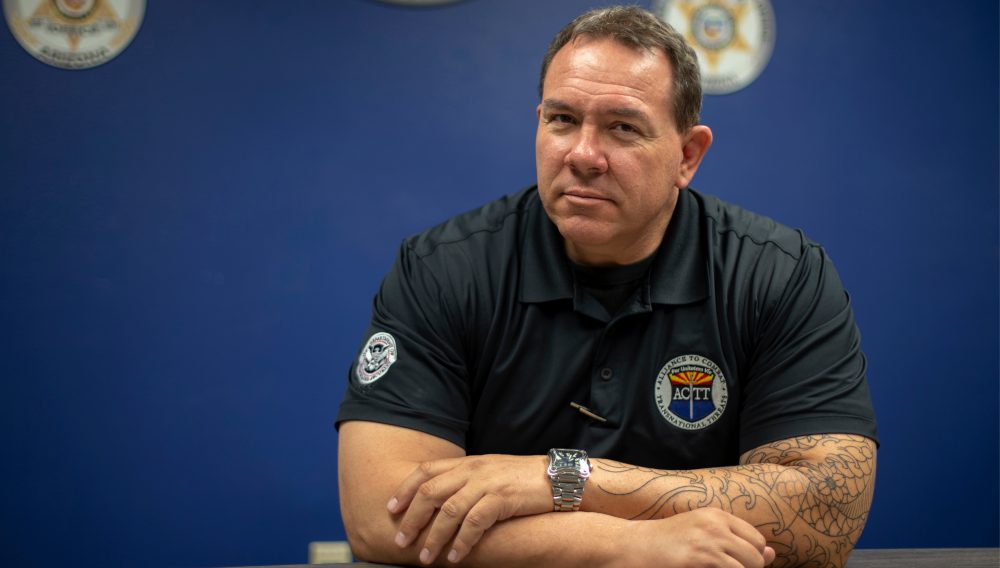On Patrol

Chadwick Cotner serves and protects in his roles in law enforcement
As a first line supervisor with the U.S. Border Patrol, Chadwick Cotner of Oro Valley, Arizona, is in charge of keeping the southern border safe. It’s a difficult job, especially when multiple federal agencies are involved and trying to work together, but Agent Cotner does his best to oversee law enforcement activities related to the arrival and departure of people and goods across the border.
Cotner is a 2019 graduate of Excelsior College who earned a Bachelor of Science in Liberal Arts. Growing up, he always wanted to serve in the military or work in law enforcement. Most men on both sides of his family served in the military, so the influence to serve was strong. “I have always had a strong desire to serve and protect,” he says. Cotner joined the U.S. Navy after graduation from high school in 1989 and served during Desert Shield/Desert Strom. When an injury left him unable to continue serving in the armed forces, he changed directions to pursue a career in law enforcement.
Cotner began working for the Maricopa County Adult Probation Department (MCAPD) in 1997. For the first year and a half, he worked in the Domestic Violence Unit, performing field duties checking on people convicted of various felonies, but who all had issues with domestic violence. This consisted of visiting the homes of probationers to check on the welfare of the family and determine the probationer’s progress with education, employment, and recovery. “This job was very interesting and flexible. It dealt with an aspect of the criminal justice system I was unfamiliar with,” Cotner says. While in this position, he and his partner were selected to supervise boxer Mike Tyson. Tyson was training for an upcoming fight in Phoenix, AZ and on probation in Maryland. Cotner also worked in the Fugitive Unit with MCAPD to locate people who stopped reporting to the probation department and thus needed to be brought to court.
After six years with MCAPD, Cotner moved on to the U.S. Border Patrol. He initially joined the U.S. Border Patrol because he wanted to be a deputy U.S. marshal. “I developed an appetite for tracking fugitives from the law while working with the Maricopa County Probation Department,” he says. Three years into working for the U.S. Border Patrol, he had an opportunity to work with U.S. marshals as a task force officer on a Fugitive Investigative Strike Team for two years. He loved the experience and was even offered a permanent position with the U.S. Marshals Service. After weighing the pros and cons, Cotner decided to stay with the U.S. Border Patrol. “One of the things I did not take into account when starting my federal law enforcement career was how much I enjoy being a border patrol agent,” he recalls.
Cotner’s favorite part about working for the U.S. Border Patrol is being able to make a difference, he says. “We help/save more lives than most people know about or want to admit,” he says. Cotner used to be more physically involved in tracking subjects in the desert and monitoring the border, but now he is a member of management and can make a difference in other ways. For example, he can help make changes to job duties or the work culture.
Several years into his career with the U.S. Border Patrol, Cotner decided to go back to school to finish the bachelor’s degree he had started but not completed in 1995. He had been about six classes away from earning his bachelor’s in 2002 when he stopped. At the time, he thought he would be entering the U.S. Border Patrol academy. As things turned out, he didn’t end up going to the academy until July 2003, and his education plans remained on the backburner for 15 years as he and his wife added to their growing family and the financial cost of school just wasn’t in the cards.
In August 2018, however, Cotner was in a more stable financial state to finish his degree. He took advantage of Excelsior’s partnership with the federal government, which provides tuition discounts and other benefits to federal government employees. “I really appreciated the reduced tuition and credit transfer policy at Excelsior. With the help from Excelsior and the tuition reimbursement program from the U.S. Border Patrol, I only had to pay for one of the four classes needed to complete my bachelor’s,” says Cotner. He plans to take advantage of the partnership again and save on tuition as he pursues a Master of Science in Criminal Justice at Excelsior.
Now that he has a bachelor’s degree, Cotner is better positioned in his career. Having a higher degree gives him an extra point when he is applying for promotions. As Cotner explains, promotions within the border patrol are based on a point score matrix. Tests and career experience make up some of the score, but points are awarded for additional experience or qualifications, like having a higher degree. “Possessing a BS, MS, or PhD gives that candidate one point for each degree held,” he explains.
Cotner has encouraged many of his coworkers to return to school to finish their higher education. “I relate to them my sense of personal satisfaction and accomplishment from finally finishing my bachelor’s,” he says. Finishing something he started years ago gave him a sense of achievement and he reminds others how far they could go if they pursue their own goals.



